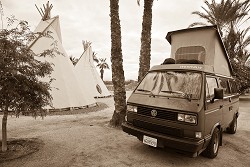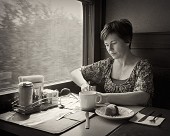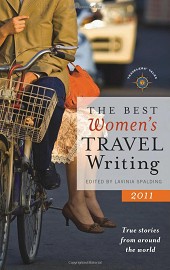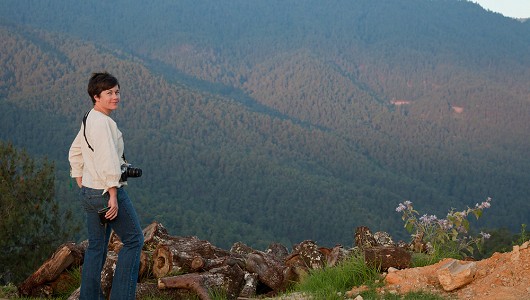Laurie Weed is a freelance writer, editor, and vagabond whose stories have also appeared in The Best Women’s Travel Writing books in 2007 and 2010. She writes for magazines, guidebooks, newspapers, websites, and commercial clients. In addition to travel, Laurie is passionate about culture, conservation, human rights, literacy and community. She made a first-hand study of cozy little towns around the world before settling on Sebastopol, CA as her current home base. When not roaming the continent in her prized VW camper van, she and her partner/photographer live and work in beautiful West Sonoma County with their infant daughter, who is either a reincarnation of Marie Laveau or the next Panchen Lama. Visit Laurie’s website at www.laurieweed.com.
When did you first know you were a traveler?
It took me a while to identify with that label, in spite of the fact that I started traveling by having an early midlife crisis, donning a backpack and flinging myself into the Third World for a year. It wasn’t until later, during my first solo trip to Mexico, that other people started referring to me as la viajera and I embraced it. I even took it up a notch, calling myself a vagabunda. And now? It’s on my business card.
What’s one place that has moved you or changed you in a significant way?
Almost every place I’ve been has affected me in some way, but nothing compares to the weeks I spent in Sri Lanka shortly after the 2004 tsunami. I was already in Asia when the tsunami struck, though too far inland to be affected personally, or see much more than what was on CNN. But a friend of mine went to Sri Lanka as a volunteer for Mercy Corps, and he asked me to come and help him with his project.
It was daunting, to say the least. Naturally, I felt compelled to help, but I worried that by showing up in person, I’d just get in the way. And to be honest, I was worried I wouldn’t be able hack it emotionally. In the end, I was glad I went. Amid deep sadness and shock, there was also unimaginable strength and grace. I learned a great deal on that trip, and I felt I contributed-probably not a lot, in the grand scheme of things, but much more than if I’d just stayed in India where it was safe.
Is there something you always do, whenever you’re on a trip?

On almost every trip, I seem to end up on some kind of mission. Sometimes a mission will take me pretty far out of my way, but I always accept the challenge.
It’s become a sort of game, and when traveling in Burma (aka Myanmar) it’s like a “Mission Impossible” reality show. With no reliable mail or shipping services, no banks, and so many harsh restrictions placed on the local people, everything gets done through a system of favors, bribes and subterfuge. Sometimes a mission will take me pretty far out of my way, but I always accept the challenge. I love a chance to beat the system, and it often leads to a good story.
What’s one important lesson you’ve learned from your travels?
That’s easy: I’ve learned how to keep things in perspective. Stress and busyness are woven into our culture in the U.S., and when I’m here, the pressure to work too much, to meet a certain standard of success-and to become self-critical if it isn’t met-can be extreme. So after traveling and living in places where people have much bigger problems, I came up with a little reality check to remind myself of how relatively easy my life is, and how lucky I’ve been: I walk over to the nearest faucet and turn it on. If potable water comes out, I’m better off than more than half of the world’s population.
Do you think women and men approach travel-or travel writing-differently? How does being a woman affect the way you travel or experience the world?
I don’t know whether gender affects the writing process, but it certainly affects how we experience the things we write about. Men and women definitely travel differently, especially in terms of meeting other people and relating to them. The most obvious disadvantage to being female is that I constantly have to think about-and adjust my plans around-the issue of personal safety. As a woman, I have to stop and consider whether arriving at that remote bus station at 3 a.m. is really such a good idea.
of course men have to pay attention to their safety as well, but it’s not the same. on the other hand, one of the huge advantages female travelers have is access to local people, particularly to other women. A solo male traveler is likely to be viewed with some suspicion, and in many cultures, it’s just not oK for women to talk to strange men. But it’s perfectly oK for the same women to invite me home for dinner after we’ve just met. I love the conversations and relationships that develop from those interactions: I feel like I’m actually learning something about the culture, direct from the source.
Through travel, have you overcome any fears or obstacles?
Although I may not have realized it (and would never have admitted it anyway), before I started traveling alone, I think I was fearful of just being alone. obviously, I had to get over it. In order to function on the road, I had to let go of shyness and learn to talk to strangers. I had to let go of expectations, and learn to be content in the now. over time, I really learned to trust myself and enjoy my own company, which has been invaluable.
In your opinion, what is the greatest reward of traveling?
For me, the greatest rewards are the connections formed with other people. It might be as simple as a few words exchanged on a train ride, or just a smile that I’ll remember for a long time. or it might be a friend made for life. Whether the encounter lasts 10 minutes or 10 years, I believe a lot of personal and even global good can come out of people just connecting with each other.
All photos by Jak Wonderly Photography











